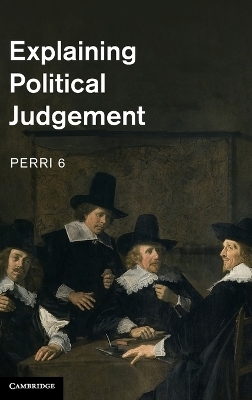
Explaining Political Judgement
Cambridge University Press (Verlag)
978-1-107-00922-6 (ISBN)
What is political judgement? Why do politicians exhibit such contrasting thought styles in making decisions, even when they agree ideologically? What happens when governments with contrasting thought styles have to deal with each other? In this book Perri 6 presents a fresh, rigorous explanatory theory of judgement, its varieties and its consequences, drawing upon Durkheim and Douglas. He argues that policy makers will understand - and misunderstand - their problems and choices in ways that reproduce their own social organisation. This theory is developed by using the Cuban Missile Crisis of 1962 as an extended case study, examining the decision-making of the Kennedy, Castro and Khrushchev regimes. Explaining Political Judgement is the first comprehensive study to show what a neo-Durkheimian institutional approach can offer to political science and to the social sciences generally.
Perri 6 is Professor of Social Policy in the Graduate School of the College of Business, Law and Social Sciences at Nottingham Trent University. He worked previously at the University of Birmingham, King's College London, the University of Strathclyde and the University of Bath. His recent books include Principles of Research Design (2011, with C. Bellamy), Paradoxes of Modernisation: Unintended Consequences of Public Policy Reform (2010, edited with H. Margetts and C. Hood), The Institutional Dynamics of Culture: The New Durkheimians, Volumes I and II (2008, edited with G. Mars), Public Emotions (2007, edited with S. Radstone, C. Squire and A. Treacher) Beyond Delivery: Policy Implementation as Sense-Making and Settlement (2006, with E. Peck), Managing Networks of Twenty First Century Organisations (2006, with N. Goodwin, E. Peck and T. Freeman) and E-Governance: Styles of Political Judgment in the Information Age Polity (2004). He currently holds a Leverhulme Trust Major Research Fellowship which supports his research on unintended and unanticipated consequences of political judgement styles in British government, 1959–74.
1. On political judgement; 2. The need for richer explanation; 3. A Durkheimian theoretical framework; 4. October 1962, before and after; 5. The Khrushchev régime; 6. The Kennedy administration; 7. The Castro revolutionary régime; 8. Implications; 9. Coda.
| Zusatzinfo | 5 Tables, black and white; 6 Line drawings, unspecified |
|---|---|
| Verlagsort | Cambridge |
| Sprache | englisch |
| Maße | 158 x 235 mm |
| Gewicht | 710 g |
| Themenwelt | Geisteswissenschaften ► Psychologie |
| Sozialwissenschaften ► Politik / Verwaltung ► Europäische / Internationale Politik | |
| Sozialwissenschaften ► Politik / Verwaltung ► Politische Theorie | |
| Sozialwissenschaften ► Soziologie ► Mikrosoziologie | |
| ISBN-10 | 1-107-00922-7 / 1107009227 |
| ISBN-13 | 978-1-107-00922-6 / 9781107009226 |
| Zustand | Neuware |
| Haben Sie eine Frage zum Produkt? |
aus dem Bereich


